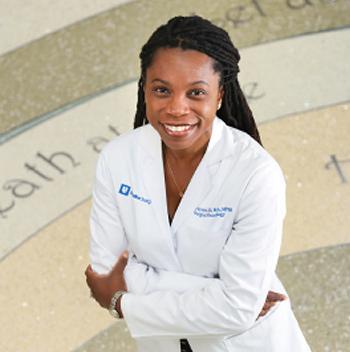
This article was first published by the Duke Cancer Institute
As a third-year student at Washington University School of Medicine, Oluwadamilola "Lola" Fayanju, MD, MA, MPHS, met a patient who taught her that the women she serves are far more than the information in their medical records.
While completing a rotation in a surgical specialty care clinic for patients who either had no insurance or couldn’t pay for care, Fayanju encountered an African American woman who was about her age at the time—late 20s to early 30s—but with distinctly different circumstances. The woman couldn’t see a doctor regularly as she had no insurance, and she was also an immigrant, far from her family.
By the time she saw Fayanju, who is now a Duke surgical oncologist focusing on breast cancer, she had a late-stage malignancy.
“After she left, I was struck by how sad it was she was seeing me with such advanced disease,” Fayanju says.
Meeting such patients face-to-face solidified Fayanju’s determination to chip away at barriers that keep African American women from getting the care they need—such as mistrust of the health care system, provider bias, and lack of health insurance. Although black women suffer fewer new breast cancer cases than white women, recent National Cancer Institute statistics report they experience a mortality rate that is 40 percent higher than that of their white counterparts.
With her medical training complete, Fayanju came to Duke in 2016. Now, through several roles she investigates racial disparities while providing superior breast cancer care.
“With each patient, I must learn who she was before she came to my office,” she says, noting a woman’s circumstances play a significant role in how she’s able to access and use health care services. “And, it’s my job to find out about the life she’ll go back to when she leaves.”
Meeting Medical Needs
Despite a busy schedule in the operating room and a research career, Fayanju takes the time to write essays that explore these problems and highlight the urgent need for a solution. In December 2019, she published an opinion piece in the Journal of the American Medical Association that from a first-hand perspective detailed how, by taking off her white doctor’s coat and walking the hospital halls, she sees how black women in America become invisible, slipping through the health-care system’s cracks.
“I have a strong kernel of rage that persists when we have the resources to correct these barriers to care,” she says. “Women should never feel they’re external to the decision-making process. They should feel they’re advocating for their own care.”
Beyond the clinic and the operating room, Fayanju conducts research to discover effective ways to improve health at the individual and population levels. Her investigative efforts are supported by a Career Development Award from the National Institutes of Health (a K08 award). First, she’s pinpointing modifiable risk factors for women who don’t receive sufficient or timely breast cancer care, as well as what prohibits the group from clinical trial participation. Second, she’s developing improved data- and evidence-based practices for the most aggressive breast cancers, and lastly, she’s analyzing how value-based health care principles can be applied to improving breast cancer care.
Face-To-Face Impact
Perhaps the most important part of Fayanju’s quest is her in-person interactions not only with her Duke patients but also with women in the Durham community. According to nurse navigator Valarie Worthy, MSN, RN, Fayanju has broken through breast cancer fears in Durham’s African American community. For example, in 2017, she launched the Women’s Health Community Engagement Task Force to reach medically underserved women with breast disease. As a part of this endeavor, she meets with community organizations to discuss breast cancer and the need for medical care in terms lay persons can easily understand. Taking that time and demonstrating that level of concern goes a long way to forging a bond of trust, Worthy says.
“There’s always been a stigma in the community about cancer; for a long time, people thought cancer and death were synonymous,” Worthy says. “For an oncologist to come into the community and provide education to people that otherwise wouldn’t have gotten it—to dispel myths— is incredibly caring, and it raises the bar.”
Additionally, representatives from Lincoln Community Health Center and the North Carolina Breast and Cervical Cancer Control Program, which provides free or low-cost breast and cervical cancer screenings to women throughout the state, attend the monthly task force meeting Fayanju leads. The task force works with Duke clinicians and researchers to meet the health needs of Durham’s women and refer those who need specialty care to Duke.
“There’s a community saying of ‘We don’t care what you know until we know that you care,’” Worthy says. “People have always known that Duke was a great place to get care, but there’s a difference in providing care and showing care. By being present in the community, Dr. Fayanju certainly brings in that dimension.”